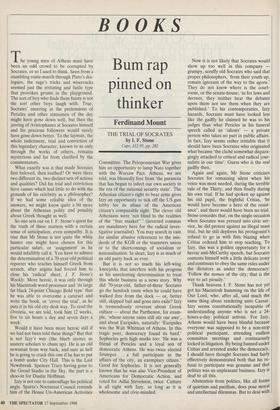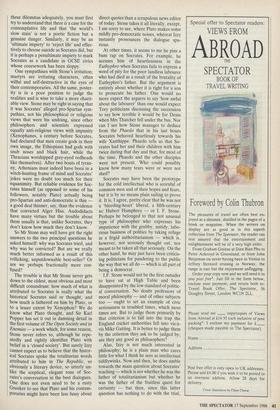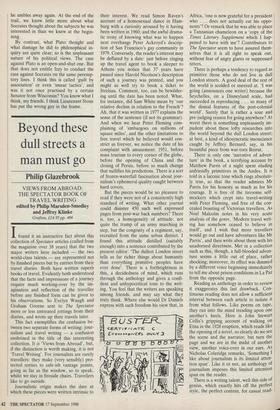BOOKS
Bum rap
pinned on thinker
Ferdinand Mount
THE TRIAL OF SOCRATES by I. F. Stone The young men of Athens must have been an odd crowd to be corrupted by Socrates, or so I used to think. Seen from a stumbling route-march through Plato's dia- logues, the sage's tricks and wisecracks seemed just the irritating and futile type that provokes groans in the playground. The sort of boy who finds them funny is not the sort other boys laugh with. True, Socrates' sneering at the pretensions of Pericles and other statesmen of the day might have gone down well, but then the jeering of Aristophanes at Socrates himself and his precious followers would surely have gone down better. To the layman, the whole indictment, trial and conviction of this legendary character, known to us only through the works of others, remains mysterious and far from clarified by the commentators.
What exactly was it that made Socrates first beloved, then loathed? Or were there two different its, two distinct sets of actions and qualities? Did his trial and conviction have causes which had little to do with the grounds of his celebrity as a philosopher? If we had some reliable idea of the answers, we might know quite a bit more about the Athenian polity and possibly about Greek thought as well.
So one sets out on I. F. Stone's quest for the truth of these matters with a certain sense of anticipation, even sympathy. It is true that Mr Stone is not quite the white hunter one might have chosen for this particular safari, or 'assignment' as he would infallibly call it. You have to admire the determination of a 70-year-old political reporter who teaches himself Greek from scratch, after angina had forced him to close his 'radical' sheet, I. F. Stone's Weekly. More heroic, it was only through his Macintosh word processor and 'its large fat black 24-point Chicago Bold type' that he was able to overcome a cataract and write the book, or 'cover the trial', as he puts it in his old city-desk way. To read the Oresteia, we are told, took him 12 weeks, five to six hours a day and seven days a week.
Would it have been more heroic still if we had not been told these things? But that is not Izzy's way (the blurb invites us austere scholars to chum up). He is an old newsman from way back, and sure as hell he is going to crack this one if he has to put a bomb under City Hall. This is the Last Newsbreak. Spencer Tracy having gone to the Gread Studio in the Sky, the part is a shoo-in for Dustin Hoffman.
Izzy is not one to camouflage his political angle. Sparta's Nocturnal Council reminds him of the House Un-American Activities Cape, £12.95, pp. 282 Committee. The Peloponnesian War gives him an opportunity to lump Nato together with the Warsaw Pact. Athens, we are told, was blessedly free from 'the paranoia that has begun to infect our own society in the era of the national security state'. The Athenian citizen's right to bear arms gives Izzy an opportunity to tick off the US gun lobby for its abuse of the American citizen's comparable right. The clever old Athenians were 'not blind to the realities of the "free market" ' (inverted commas are mandatory here for the radical inves- tigative journalist). You may search in vain for similar abusive references to the mis- deeds of the KGB or the teamsters union or to the shortcomings of socialism or nationalisation. In short, Izzy is as much of an old party hack as ever.
But it is not so much his left-wing kneejerks that interfere with his progress as his unrelenting determination to treat this whole business as a news story. Why did 70-year-old, father-of-three Socrates go the hemlock route when he could have walked free from the dock — or, better still, skipped bail and gone into exile? Izzy is tremendously reverent about Greek culture — about the Parthenon, for exam- ple, 'whose serene ruins still stir our awe', and about Euripides, naturally: 'Euripides was the Walt Whitman of Athens. In this tragic poet, democracy found its bard.' Sophocles gets high marks too: 'He was a friend of Pericles and a loyal son of democratic Athens. He was twice elected Strategos . a full participant in the affairs of the city, an exemplary citizen.' Good for Sophocles. It is not generally known that he was also Vice-President of Americans for Democratic Action, and voted for Adlai Stevenson, twice. Culture is all right with Izzy, so long as it is wholesome and civic-minded. Now it is not likely titat Socrates would show up too well in this company grumpy, scruffy old Socrates who said that proper philosophers, 'from their youth up, remain ignorant of the way to the agora.' They do not know where is the court- room, or the senate-house; 'as for laws and decrees, they neither hear the debates upon them nor see them when they are published.' To his contemporaries, Izzy hazards, Socrates must have looked less like the gadfly he claimed he was to his judges than what Pericles in his funeral speech called an `idiotes' — a private person who takes no part in public affairs. In fact, Izzy seems rather irritable that it should have been Socrates who originated what became 'the cliche somewhat dispara- gingly attached to critical and radical jour- nalists in our time'. Guess who is the real gadfly then.
Again and again, Mr Stone criticises Socrates for remaining silent when his voice was most needed, during the terrible rule of the Thirty, and then finally during his own trial. If he had spoken up against his old pupil, the frightful Critias, 'he would have become a hero of the resist- ance', and there would have been no trial. Stone concedes that, on the single occasion when Socrates was pressed into civic ser- vice, he did protest against an illegal mass trial, but he still deplores his protagonist's refusal to go in with fists blazing when Critias ordered him to stop teaching. To Izzy, this was a golden opportunity for a heroic anti-McCarthy speech, but Socrates contents himself with a little delicate irony and continues to obey the same rules under the dictators as under the democracy: `Follow the nomos of the city; that is the way to act piously.'
Thank heavens I. F. Stone has not yet got his Macintosh humming on the life of Our Lord, who, after all, said much the same thing about rendering unto Caesar. Izzy seems constitutionally incapable of understanding anyone who is not a 24- hours-a-day political activist. For Izzy, Athens would have been blissful because everyone was supposed to be a non-stop political participant, attending endless committee meetings and continuously locked in litigation. By being banned under Critias and arrested under the democracy, I should have thought Socrates had fairly effectively demonstrated both that his re- fusal to participate was genuine and that politics was an unpleasant business. Izzy is deaf to all this.
Abstention from -politics, like all forms of quietism and pacifism, does pose moral and intellectual dilemmas. But to deal with these dilemmas adequately, you must first try to understand that there is a case for the contemplative life and that 'the world's slow stain' is not a poetic fiction but a genuine danger. Similarly, it may be an `ultimate impiety' to 'reject life' and effec- tively to choose suicide as Socrates did, but it is perhaps a penultimate impiety to mark Socrates as a candidate in GCSE civics whose coursework has been sloppy.
One sympathises with Stone's irritation; martyrs are irritating characters, often wilful and self-destructive in the eyes of their contemporaries. All the same, poster- ity is in a poor position to judge the realities and is wise to take a more charit- able view. Stone may be right in saying that it was Socrates' alleged pro-Spartan sym- pathies, not his philosophical or religious views that were his undoing, since other philosophers and scientists expressed equally anti-religious views with impunity (Xenophanes, a century before Socrates, had declared that men create gods in their own image, the Ethiopians had gods with snub noses and black hair, while the Thracians worshipped grey-eyed redheads like themselves). After two bouts of tyran- ny, Athenians must indeed have been in a witch-hunting frame of mind and Socrates' jokes were no doubt too much for their equanimity. But reliable evidence for Soc- rates himself (as opposed to some of his followers, notably Plato) actually being pro-Spartan and anti-democratic is thin a good deal thinner, say, than the evidence that convicted Alger Hiss. Audodidacts have many virtues but the trouble about them usually is that, unlike Socrates, they don't know how much they don't know.
So Mr Stone may well have got the right answers to the two principal questions he asked himself: why was Socrates tried, and why was he convicted? But are we really much better informed as a result of this rollicking, unputdownable best-seller? Or are we perhaps fractionally more con- fused?
The trouble is that Mr Stone never gets down to the oldest, most obvious and most difficult conundrum: how much of what is attributed to Socrates is really what the historical Socrates said or thought, and how much is fathered on him by Plato, or to a lesser extent by Xenophon? We do know what Plato thought, and Sir Karl Popper has set it out in damning detail in the first volume of The Open Society and its Enemies — a work which, for some reason, Stone never refers to, although he repe- atedly and rightly identifies Plato with belief in a 'closed society'. But surely Izzy cannot expect us to believe that the histor- ical Socrates spoke the totalitarian words attributed to him in The Republic, so obviously a literary device, so utterly un- like the sceptical, elegant tone of Soc- rates's conversation in the best dialogues. One does not even need to be a rusty Greeker to see that Plato and his contem- poraries might have been less fussy about direct quotes than a scrupulous news editor of today. Stone takes it all literally, except, I am sorry to see, where Plato makes some mildly pro-democratic noises, whereat Izzy instantly pronounces the dialogue spu- rious.
At other times, it seems to me he pins a bum rap on Socrates. For example, he accuses him of heartlessness in the Euthyphro when Socrates fails to express a word of pity for the poor landless labourer who had died as a result of the brutality of Euthyphro's father. But the argument is entirely about whether it is right for a son to prosecute his father. One would no more expect the arguers to say 'how awful about the labourer' than one would expect Tory politicians discussing the succession to say how terrible it would be for Denis when Mrs Thatcher fell under the bus. Nor can I see how Stone manages to deduce from the Phaedo that in his last hours Socrates behaved heartlessly towards his wife Xanthippe. Phaedo tells us that So- crates had her and their children with him twice during that day and that, for most of the time, Phaedo and the other disciples were not present. Who could possibly know how many tears were or were not shed?
Socrates may have been the prototype for the cold intellectual who is scornful of common men and of their hopes and fears, but it is by no means plain sailing to prove it. It is, I agree, pretty clear that he was not a 'bleeding-heart' liberal, a fifth-century BC Hubert Humphrey — or I. F. Stone. Perhaps he belonged to that not unusual type of philosopher who expresses his impatience with the grubby, untidy, labo- rious business of politics by taking refuge in a frigid authoritarianism — which is, however, not seriously thought out, nor meant to be taken all that seriously. On the other hand, he may just have been criticis- ing politicians for pandering to the public the way that we all do — which is all part of being a democrat.
I.F. Stone would not be the first outsider to have sat at High Table and been disappointed by the low standard of politic- al conversation. No doubt professors of moral philosophy — and of other subjects too — ought to set an example of civic seriousness in troubled times, which most times are. But to judge them primarily by that criterion is to fall into the trap the England cricket authorities fell into vis-a- vis Mike Gatting. It is better to judge them by the criterion they ask to be judged by; are they any good as philosophers?
Alas, Izzy is not much interested in philosophy; he is a plain man who cares little for what I think he sees as intellectual tiddlywinks. Now and then, he does amble towards the main question about Socrates' teaching — which is not whether he was the father of totalitarianism but whether he was the father of the fruitless quest for certainty — but then, since this latter question has nothing to do with the trial he ambles away again. At the end of the trail, we know little more about what Socrates thought about the subjects he was interested in than we knew at the begin- ning.
By contrast, what Plato thought and what damage he did to philosophical in- quiry are quite clear; so is the unpleasant nature of his political views. The case against Plato is an open-and-shut one. But that does not entitle Izzy to conduct the case against Socrates on the same peremp- tory lines. I think this is called 'guilt by association' or even 'smear tactics', and was it not once practised by a certain Senator from Wisconsin? You know what I think, my friends. I think Lieutenant Stone has put the wrong guy in the frame.




































































 Previous page
Previous page